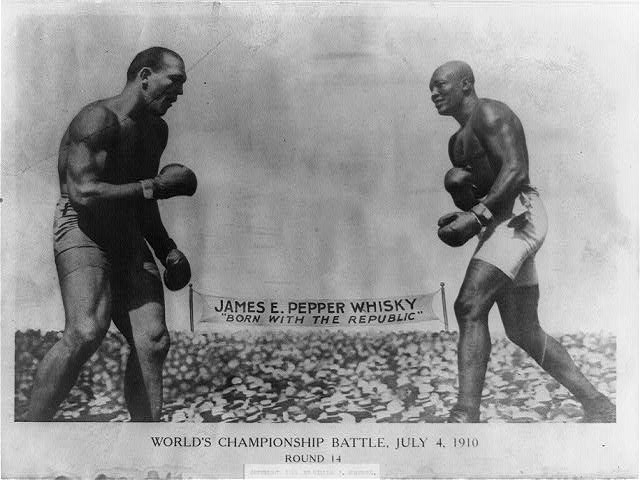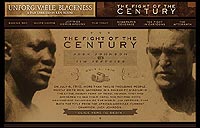|
|||||||||||||||||
|
|
|
|||||||||||||||
|
Why Talk about Freedom?—Jack Johnson By: George Hanson Jr., Esq - February 15, 2010 Before Muhammad Ali, there was Jack Johnson—black, brash, bold, uncompromising. He was a rich celebrity athlete looming larger than life, breaking social taboos and oftentimes causing men to question their manhood. In the process, he became the most notorious African-American on the planet. Facing the world unafraid, Johnson won the heavyweight championship, made a fortune, drove fast cars, wore expensive suits, appeared regularly in the press, and later in radio and in motion pictures, married three white women, became a fugitive, fled the States for seven years, spent a year in jail, authored two books and patented a wrench before his life ended in a car crash in 1946. Why talk about freedom? I discovered Jack Johnson in a dusty volume of Before the Mayflower: A History of Black America, 1619-1962 (1963) by Lerone Bennett tucked away on a bookcase in my seventh grade homeroom. One year removed from Jamaica, I read the entire three-volume set which gave me a crash course in American history. Given the backdrop of the time, it literally blew my mind that the flamboyant Johnson became the first African-American heavyweight champion in 1908 marching to the beat of his own drum. I remember being able to find a few pictures of Johnson in Ebony magazine and placing them on the closet doors in my bedroom. I had found a hero. Therefore, it was no surprise that when I started boxing my head was shaved just like Johnson’s. Why talk about freedom? Almost 60 years after his death, Jack Johnson rose from the dead when in January 2005 PBS aired Unforgiveable Blackness: The Rise and Fall of Jack Johnson, a two-part documentary by acclaimed filmmaker Ken Burns. According to Burns, "Johnson in many ways is an embodiment of the African-American struggle to be truly free in this country — economically, socially and politically. He absolutely refused to play by the rules set by the white establishment, or even those of the black community. In that sense, he fought for freedom not just as a black man, but as an individual." Why talk about freedom? Jack Johnson, the greatest heavyweight boxer of all time, is one of the most remarkable individual to ever walk the face of the earth. At a time when a mere glance at a white woman or any transgression could get a person of color swinging from a hangman’s noose, Johnson unapologetically lived the literal meaning of Thomas Jefferson’s phrasing in The Declaration of Independence, “We hold these truths to be self evident, that all men are created equal.” Therefore, Johnson negotiated his own contracts, openly dated white women, drove fast cars, wore nice suits and went wherever he wanted. Johnson was a man and he was free. Someone forgot to tell him that Jefferson, a slave owner who fathered many children with one of his slaves, never intended for equality to extend to people of color. Why talk about freedom? A renaissance man, Johnson was an accomplished dancer, loved operas, read extensively and played the piano. He wrote two memoirs of his life, Mes Combats (1914) and Jack Johnson in the Ring and Out (1927). Johnson was also an inventor. On April 8, 1922 he patented a wrench. Legend has it that once when he was pulled over for a $50 speeding ticket Johnson gave the officer a $100 bill, telling him to keep the change because he would be heading back that way at the same speed. Why talk about freedom? The archives at Tuskegee Institute started keeping records of lynching in 1882, when Johnson was four-years old. From that time until when he won the heavyweight championship in 1908, there were 2,367 lynchings of black women and men in America. There were an additional 1,150 lynchings from 1909 until Johnson’s death in an automobile accident in 1946. Many of these were well-attended public events as whites came out dressed in their Sunday best to witness these heinous murders. How Johnson escaped being a lynching statistic is remarkable. Why talk about freedom? Arthur John (Jack)
Johnson was born on March 31, 1878 in Galveston,
Texas the second of six children born to Henry and
Tina (Tiny) Johnson, both former slaves. He left
school in the fifth grade taking various odd jobs
around South Texas. Johnson started boxing as a
sparring partner and participated in many “battle
royals,” matches in which young Blacks entertained
white spectators who threw money to the winner. The
young pugilist turned professional in 1897 winning
the heavyweight championship December 26, 1908 by
beating Tommy Burns in Australia in front of 20,000
spectators. The mismatch was stopped in the 14th
round by the police because they had seen enough.
Johnson from the onset taunted his opponent, holding
him up every time he would knock him down ignoring
all the threats and racial epithets that were being
hurled at him. Why talk about freedom? The heavyweight championship was the ultimate prize or definition of manhood. Racial animosity among whites ran so deep that they immediately called for a White Hope to defeat “the uppity negro.” Johnson successfully defended his championship four times before former undefeated heavyweight champion James J. Jeffries came out of retirement stating, "I am going into this fight for the sole purpose of proving that a white man is better than a Negro.” On July 4, 1910, in front of a crowd of 22,000 in Reno, Nevada, Johnson with a big smile on his face toyed with the former champion, dropped him twice in the 15th round forcing Jeffries handlers to save the former champion from further punishment. For his troubles, Johnson earned an unheard of sum of $225,000—at a time when the average annual income was less than $750. Why talk about freedom? The news of Johnson’s trouncing of Jeffries caused riots in 25 cities as black celebration was subdued by police and angry whites. When the dust settled, 23 blacks and two whites were dead and hundreds more sustained injury. The feature film footage of the fight was subsequently pulled from movie houses. The Texas Legislature banned films of Johnson’s victories over whites for fear of more riots and Congress banned prizefight films from 1912 until 1940. Why talk about freedom? If a succession of white hopes couldn’t beat him, the U.S. government certainly would. Jack Johnson became the first person prosecuted under the Mann Act of 1910 which prohibited so-called white slavery. It banned the interstate transport of females for immoral purposes. Although the act was intended to address the commercialization of prostitution it was used against Johnson to punish him for his success. Bell Schreiber, a Chicago prostitute who became Johnson’s lover testified against him and he was convicted in 1913. It made no difference that the so-called crime occurred before the Mann Act became law. The sentencing judge admitted that Johnson was convicted to “send a message to Negroes by convicting one of the best known men of their race.” Jackson defended his title once in 1912 and fled the country in 1913. Why talk about freedom? Johnson successfully defended his championship three times on the road—twice in France and once in Argentina. He lost the heavyweight championship to Jess Willard in the 26th round on April 5, 1915 under the scorching sun of Havana, Cuba. After losing to Willard, Jackson won all nine of his next matches, fighting in Spain and Mexico. Tired of living in Europe, South America and Mexico, he returned to the United States on July 20, 1920 and was arrested and sentenced to the U.S. Penitentiary in Leavenworth, Kansas for a year. America had finally imprisoned the iconoclast. At Leavenworth, Jackson was accorded all the privileges of a celebrity. He fought and won four professional bouts behind bars, two on November 11, 1921. Upon his release on July 9, 1921 he continued boxing and living life on his own terms. Johnson was a fixture of the Harlem nightlife opening up a club at 142nd Street and Lenox Avenue. In addition, he lectured, sold stocks, worked as a movie extra and raced fast cars. He never reclaimed his former glory in the squared circle. However he scored his last knockout victory at age 54 in 1932. Johnson finally hung his gloves up at age 60 in 1938. Why talk about freedom? Ken Burns noted that Johnson’s conviction was “racist from the beginning to the end and one of the greatest abuses of justice involving an American athlete this country has ever seen.” In 2008 a bill requesting President George W. Bush to pardon Johnson passed the House but failed to pass the Senate. Isn’t it ironic that April 2009, almost 100 years after the passage of the Mann Act, Senator John McCain requested a presidential pardon for Johnson from President Barack Obama. Maybe, this year Jack Johnson will be granted a posthumous pardon—100 years after demolishing Jeffries. Maybe then, we can talk about freedom and Tiger Woods! Continue to support the sweet science, and remember, always carry your mouthpiece! Mr. Hanson can be contacted at ghanson3@hotmail.com |
|||||||||||||||||



